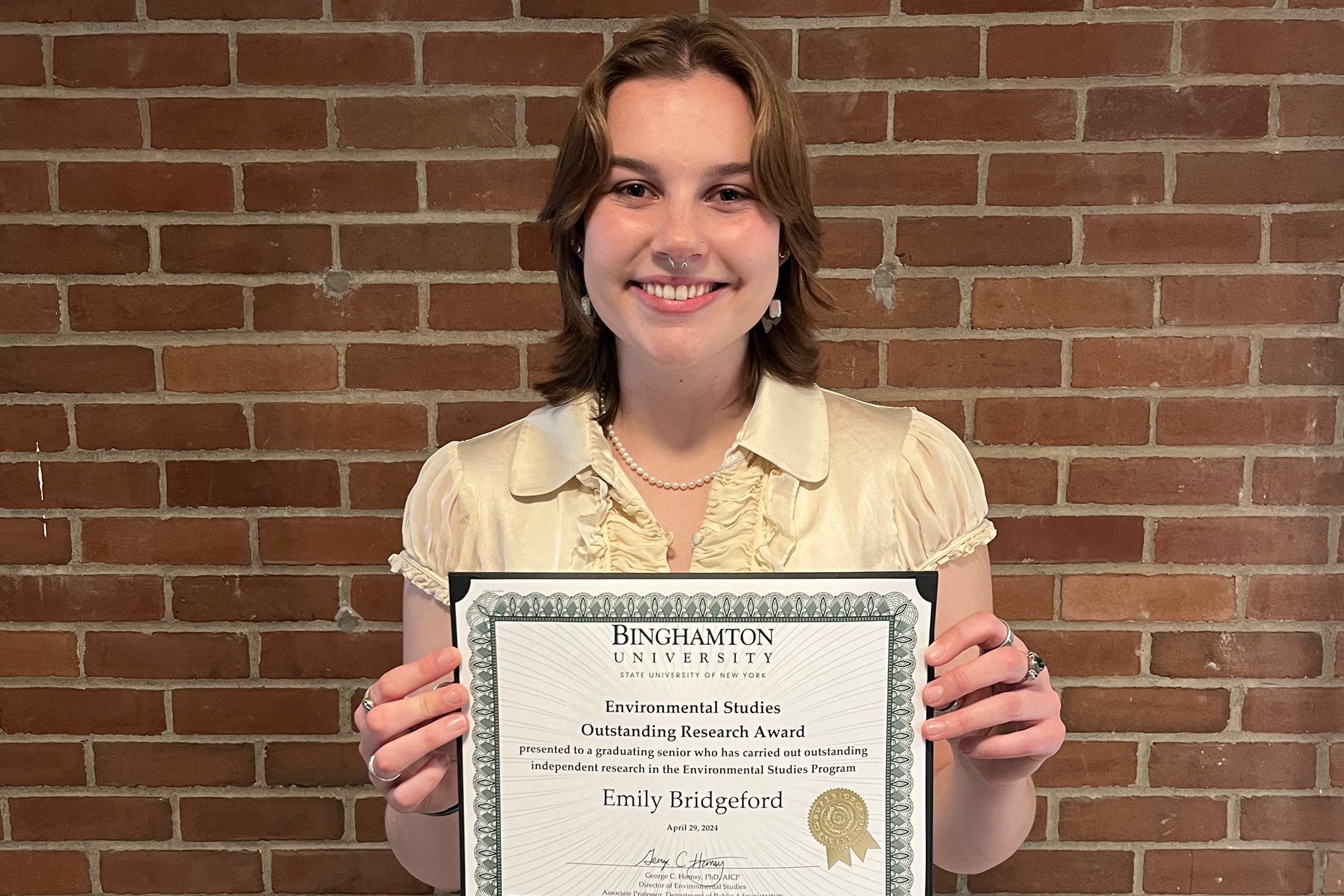NYSP2I research program sparks student’s future in sustainability
New NYSP2I program to connect university students to original academic research sets a solid footing for a future in sustainability, according to one Binghamton University student.
Emily Bridgeford, a 2024 graduate from Binghamton University, was recently selected for the Outstanding Research Award by the university’s environmental studies program. Each year, the award is given to a single graduating senior in the program “who has carried out outstanding independent research.”
Binghamton—officially the State University of New York (SUNY) at Binghamton—is one of five partner universities that make up the New York State Pollution Prevention Institute (NYSP2I). Cornell University, Clarkson University, Rensselaer Polytechnic Institute, and Rochester Institute of Technology (RIT) also make up the collaboration. It is led by RIT’s Golisano Institute for Sustainability and sponsored by the New York State Department of Environmental Conservation.
Sparked by opportunity to research
In the summer of 2023, four of the partner universities participated in the inaugural NYSP2I Student and Faculty Research Program, with each team tasked to explore how packaging could be improved to extend the life of food and avoid spoilage to offset food waste.
Bridgeford was part of a team of four from Binghamton that investigated the use of per- and polyfluoroalkyl substances (PFAS) in disposable containers for takeout food. The students explored public perceptions in their community about PFAS in disposable food packaging using a research methodology known as citizen science. Once the research was complete, all four teams participated in a research symposium organized by NYSP2I and held at Binghamton last fall.
Bridgeford points to her experience through the program as pivotal to receiving the research award.
“Since completing the research project with NYSP2I, my interest in research was strengthened, especially related to food systems and waste reduction-related issues,” she said.
A solid footing
Over the past year, Bridgeford has continued to dedicate her time to issues related to sustainability and the environment. Of note, she became a climate ambassador at Binghamton’s Kaschak Institute to help the university reduce its carbon emissions. The effort was part of the 1MReady campaign, which was first launched at Binghamton with plans to expand it to all SUNY campuses.
“I feel that my research with NYSP2I helped me to be more educated in the field of waste reduction, and attending the symposium helped me learn how to present my knowledge,” she noted.
Bridgeford completed her senior thesis project under Nirav Patel, the faculty member who led the Binghamton team during the NYSP2I program. For the project, she examined the relationship between food accessibility and knowledge as they relate to sustainable behaviors in upstate New York.
“During the research for NYSP2I, many Binghamton residents that my group surveyed noted they did not know about different recycling practices and the harms of certain chemical contaminants such as PFAS,” she explained. “This led me to research more on the food availability and accessibility in Binghamton and surrounding regions.”
This fall, Bridgeford will continue her passion for community-focused sustainability research at the SUNY College of Environmental Science and Forestry. There, she will pursue a master of science degree in environmental planning, policy, and communication with a focus in food systems.
“NYSP2I has surely opened up many doors for me in my future,” she said. “And I have made amazing connections through the program that continue to help me succeed.”
---
The 2024 NYSP2I Student and Faculty Research Program—Reagents of Change—is already underway. This year, the student teams are conducting original research in green chemistry and safer chemicals. They will present the results of their work at a symposium in Albany, New York, on September 20.







